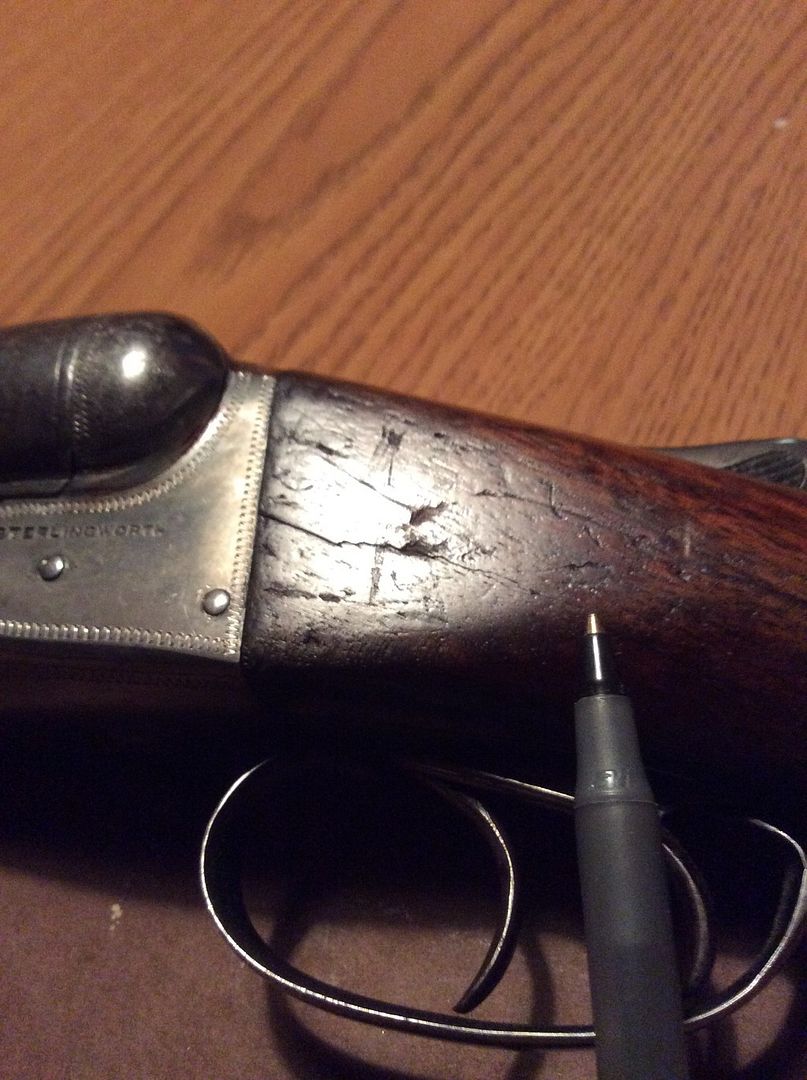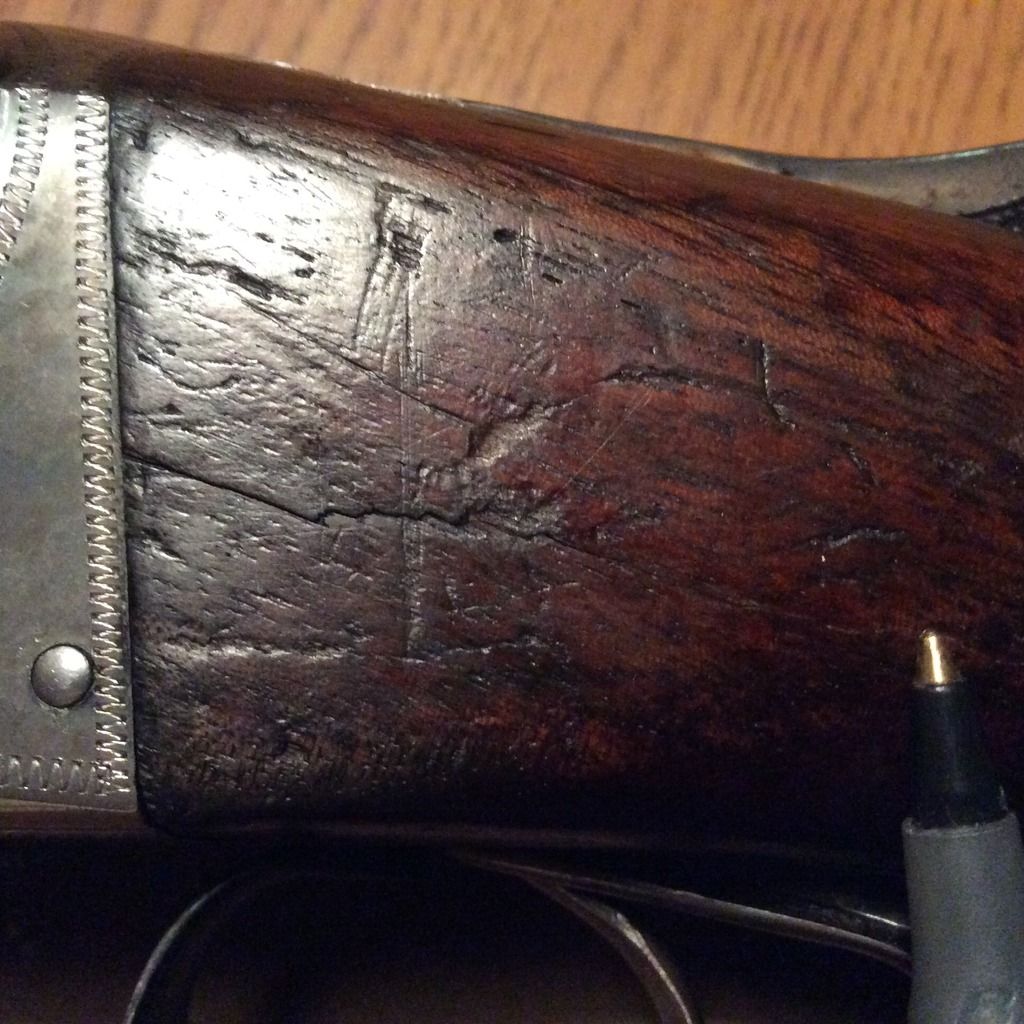Page 1 of 1
Cracked Stock
Posted: Thu Mar 12, 2015 9:02 pm
by Jeff S
Gentlemen, I'm begging for some guidance from anyone that has experience with this tragedy. Of the shotguns that I own, this weathered, 1923 12 gauge Sterlingworth is my absolute favorite. Aside from the fact that it was my grandfather's, it's the only gun that I can shoot skeet with. As you can see in the attached pictures, it has developed a rather ominous looking crack. Is this something that can be repaired, or will I have to replace the stock? For what it's worth, mechanically, the gun is sound. Aesthetically, it's in poor shape.


Re: Cracked Stock
Posted: Fri Mar 13, 2015 12:38 am
by fnj682
Someone with experience should be able to repair that crack to where the repair will be near invisible. I would definitely have it looked at before it gets worse.
Re: Cracked Stock
Posted: Fri Mar 13, 2015 6:41 am
by snakeeater
Try Dewey Vicknair Litiz Pa. He repaired a cracked but stock for me . If he cant fix it , it cant be fixed. 717 626 4226 . Good luck. Very Respectfully, Fritz
Re: Cracked Stock
Posted: Fri Mar 13, 2015 10:59 am
by mike campbell
It can most likely be repaired.
Ultimately, you'll have to decide how much cash it's worth to you to keep shooting it.
Seems it's greatest value lies in the fact that it was your grandfather's. You've been happy so far with the way grampa's gun looks, so that needn't change. So the cheapest solution would be to leave it as is and retire it from shooting and find another gun to shoot skeet with.
While it may be "mechanically sound", it is functionally out of service. A functional repair to the inside, ( said repair being invisible, though the original crack, finish, exterior patina, etc. will be the same) will probably cost 2 hours of shop time ($100-200 ?) plus round trip shipping ($50?) if need be. The cost of other options (repair plus refinish or replace the stock) will go up substantially. Thus the need to consider what it's worth to you as a skeet shooter, since it's value as an heirloom hasn't been diminished.
Re: Cracked Stock
Posted: Mon Mar 16, 2015 2:50 pm
by Jeff S
Gentlemen! I greatly appreciate all of the suggestions regarding my cracked stock. Many of you have been down this road before and you know what goes through a guys mind. Should I fix it or retire it? Well, at lunchtime I brought it over to the gunsmith (Bacheldor's) and had the team take a look at it. They seemed very confident that it can be fixed with Acraglas. Parker (Brad's son) looked me right square in the eyes and assured me that the repair would be durable. When I pick it up in 4 weeks, I'll run 100 rounds through it and let you know if it works. Jeff
Re: Cracked Stock
Posted: Tue Mar 17, 2015 11:17 pm
by Rajo
My 2 cents. I recently acquired a 1929 20 ga Sterlingworth with a cracked stock at the wrist that looked much worse than what I can tell by your pic. After significant research I learned that a veterinary hypodermic needle and some quality wood glue can work miracles if clamped up and left alone for a couple weeks. I took my time and wound up refinishing the entire stock with a very meticulous process that required 14 VERY thin coats of Tru Oil. I couldn't be more pleased with how it turned out and I just shot a box of #8 Polywads through it this past weekend. Rock solid and the now barely noticeable crack is a mere character mark as far as I'm concerned. Full disclosure, I had no idea what kind of gun I had on my hands when I decided to take this thing apart and tackle the project.
Re: Cracked Stock
Posted: Wed Mar 18, 2015 7:29 am
by Jeff S
Rajo - Very interesting and thanks for the feedback. When you tackle a problem by yourself, and it works, it gives you a real sense of pride. I like the sounds of the finish. Did it come out "glossy" or "soft"?
Re: Cracked Stock
Posted: Wed Mar 18, 2015 1:11 pm
by Rajo
It's actually pretty easy to produce a final finish to suit ones personal preference. A glossy finish can be tempered to produce an eggshell type of sheen by lightly buffing with steel wool, very high grit sandpaper, or an even less abrasive material like burlap which is what I used. The secret (using the Tru Oil product anyway) is in the "lightness" of the final coat which I produced by just dampening an entire piece of a small lint-free cotton rag with Tru Oil and giving the stock a very quick rub down AFTER the final buffing.
Fun project really if you like that sort of thing. Like you say, also gives you a greater sense of pride as owner of one of these guns. As my wife says, me and the Fox have bonded. Lol



